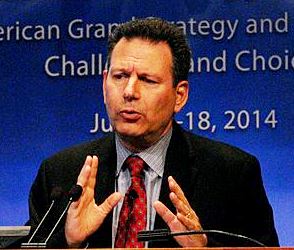A Quote by Michael Hastings
Gore Vidal, Glenn Greenwald, Noam Chomsky, all these guys talk about how the United States became a national security state after World War II. I agree with that thesis. Essentially there's this bipartisan foreign policy elite who've been calling the shots for the last few decades and they're clearly still in control regardless of how clownish or absurd or stupid they demonstrate themselves to be. There's no shaking their orthodoxy.
Quote Topics
About
Absurd
After
Agree
Became
Been
Bipartisan
Calling
Calling The Shots
Clearly
Control
Decades
Demonstrate
Elite
Essentially
Few
Foreign
Foreign Policy
Gore
Guys
How
Last
National
National Security
Orthodoxy
Policy
Regardless
Security
Shaking
Shots
State
States
Still
Stupid
Talk
Themselves
Thesis
United
United States
War
World
World War
World War I
World War II
Related Quotes
Gore Vidal, Glenn Greenwald, Noam Chomsky, talk about how the U.S. became a national security state after World War II. Essentially there's this bipartisan foreign policy elite who've been calling the shots for the last few decades and they're clearly still in control regardless of how clownish or absurd they demonstrate themselves to be. There's no shaking their orthodoxy. To me it was the most depressing thing, these full-scale military interventions firsthand for a number of years, seeing how quickly we can get involved in another war with very little debate.
While the foreign policy elite in Washington focuses on the 8,000 deaths in a conflict in Syria – half a world away from the United States – more than 47,000 people have died in drug-related violence since 2006 in Mexico. A deeply troubled state as well as a demographic and economic giant on the United States’ southern border, Mexico will affect America’s destiny in coming decades more than any state or combination of states in the Middle East.
Foreign policy always has more force and punch when the nation speaks with one voice. To remain secure, prosperous, and free, the United States must continue to lead. That leadership requires a president and Congress working together to fashion a foreign policy with broad, bipartisan support. A foreign policy of unity is essential if the United States is to promote its values and interests effectively and help to build a safer, freer, and more prosperous world.
The thing that should most concern us is a shift in American foreign policy. We have had a bipartisan belief in American foreign policy based on the post-World War II institutions that believed in democratic global world, which Russia and the Soviet Union was often seen as hostile to. And most Republicans and Democrats have always basically believed in this world order. Donald Trump and Vladimir Putin and maybe Marine Le Pen do not agree with this basic structure of the world.
Actually, the phrase "national security" is barely used until the 1930s. And there's a reason. By then, the United States was beginning to become global. Before that the United States had been mostly a regional power - Britain was the biggest global power. After the Second World War, national security is everywhere, because we basically owned the world, so our security is threatened everywhere. Not just on our borders, but everywhere - so you have to have a thousand military bases around the world for "defense."
World War II made war reputable because it was a just war. I wouldn't have missed it for anything. You know how many other just wars there have been? Not many. And the guys I served with became my brothers. If it weren't for World War II, I'd now be the garden editor of The Indianapolis Star. I wouldn't have moved away.
We have to recognize that the reason that the global order that we've enjoyed and almost take for granted over the last several years exists is that after World War II, the United States and its allies tried to build an antidote to what they had seen between World War I and World War II. There, they'd seen protectionism, beggar-thy-neighbor trading policies, so they said, we'll build an open international economy. And they did that.
World War II is smothered in sentimentality and nostalgia. What's interesting about Vietnam is that sentimentality is just not there, so you're given kind of a clean access to it in one way. It's also a war that represents a failure for the United States. Many people came back feeling like they never wanted to talk about it again. And so we developed a national amnesia.
































